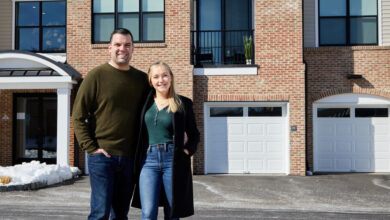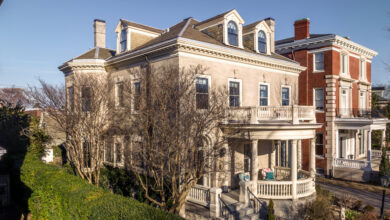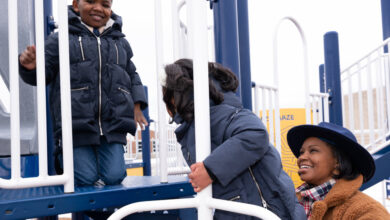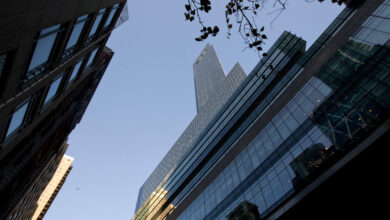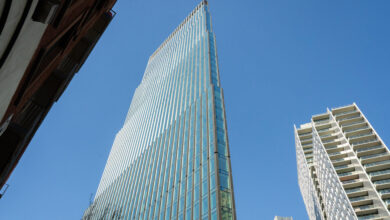House Hunting on Majorca: A Stone Manor Mixing Spanish, French Styles

[ad_1]
Eight Bedrooms Near the Coast of Majorca
$2.74 MILLION (2.625 MILLION EUROS)
This eight-bedroom stone manor house is in the town of Sóller, near the northwest coast of Majorca, one of Spain’s Balearic Islands in the heart of the Mediterranean Sea.
The home was renovated several years ago, but the owners maintained its original architectural features — a mixture of Modernist, Majorcan and French styles, including high ceilings, arched doorways, elaborate molding and a fancy staircase, said Eddy Barrera, the director of Engel & Völkers Mallorca West office.
“Sóller is a fairly special village because it has influence from France,” Mr. Barrera said of the town, which sits in a valley in the Tramuntana mountain range, home to the island’s highest peaks. “French fruit dealers used to come to Sóller to get oranges and other citrus. And a lot of Majorcans went to France at the end of the 1800s and early 1900s, when the island was fairly poor. They returned with money and French influence.”
This property was likely built toward the end of the 19th century, though the exact year is not known because the island did not start registering properties until 1900, he said.
The three-story house, with just under 7,000 square feet, has a 750-square-foot courtyard with a pool, and it fronts a residential street. The front door opens into a foyer with the original gray stone floor. At the opposite end is a second entrance from the courtyard and a striking curved stone staircase, also original to the home. The living room has a fireplace and floor-to-ceiling windows; an office has traditional hydraulic mosaic floor tiles. An arched doorway in the office leads to a room with a wet bar and beverage chiller.
A door next to the staircase leads to the connected kitchen and dining room, both of which have decorative hydraulic floor tiles and glass doors to the courtyard.
One floor up is a second living room, two bathrooms and three bedrooms, including the primary suite, which has a Juliette balcony overlooking neighboring gardens. The owners repainted the doors and door frames a deep golden mustard that was original to the house, Mr. Barrera said.
Five more bedrooms and two bathrooms are on the third floor. The roof has a covered terrace, but it needs to be improved, he said.
The home is a short walk from Sóller’s main square, Plaza de la Consitución, which is ringed with restaurants and cafes. Sant Bartomeu Church towers above the square, its Modernist facade a 20th-century renovation to the much older stone parish church.
A historic wooden train runs from Sóller to the resort city of Palma, Majorca’s capital. Popular with tourists, the train dates to 1912 and was originally used to transport citrus fruit, textiles and other goods. The harbor town of Port de Sóller is about a five-minute drive. Palma de Mallorca Airport is about a 40-minute drive.
Market Overview
The largest of the islands that make up the Balearic archipelago (the main ones being Majorca, Minorca, Ibiza and Formentera), Majorca has seen a surge in home sales in recent years, as the Covid-19 pandemic sent many Europeans packing in search of family retreats in secure locations.
“People know what they’re looking for and they’re not wasting time,” said Jack Newberry, an associate property agent with Balearic Properties. “Without any kind of pushing, people will go for asking price or over.”
According to a market report from Engel & Völkers, 2021 marked a record year for sales in the Balearics, with a transaction volume of 6.6 billion euros ($6.89 billion) — 80 percent higher than in 2020. About 40 percent of transactions involved international buyers. The unrelenting demand has drained the supply of available homes, further adding to price pressure.
“This is the first year in about a decade where the number of properties on the market is going down,” said Florian Hofer, the managing director of Engel & Völkers Balearics. “In the past our offices always had about 2,500 properties for sale. It’s just below 2,000 at the moment.”
While there is considerable new construction, it usually requires tearing down older properties, as about 40 percent of Majorca is protected area, Mr. Hofer said. The island’s advantages over some other popular Mediterranean destinations include its highly developed infrastructure, major international airport, many international schools, and the fact that it doesn’t have an off-season, he said.
In the most exclusive areas, like Port d’Andratx and Son Vida — known as “the Beverly Hills of Palma” — homes start at around 3 million euros ($3.13 million), Mr. Hofer said. But smaller properties are available in the city of Palma for considerably less. “You can get a fantastic penthouse in Palma for 1 million euros ($1.043 million), or a one-bedroom apartment with a terrace for 400,000 ($417,000),” he said.
Seeking to tamp down demand from outside investors, the Balearic government last year announced a ban on new holiday rental licenses, which are required for owners who wish to rent out their properties. The ban is in effect through 2026. “Certain areas were getting saturated,” Mr. Newberry said. “There were areas where the streets were absolutely packed because everyone was renting out their properties. But the ban hasn’t really cooled the market.”
Who Buys on Majorca
The market is largely driven by foreign investment, predominantly from Germany, Scandinavia and Britain, Mr. Newberry said. That demand is so intense right now that most of the island’s international schools have waiting lists, he said.
The town of Sóller has a very diverse population made up of at least a dozen different nationalities, including some Americans, Mr. Barrera said.
Mr. Hofer noted that the recent addition of direct flights between New York City and Palma is expected to drive even more interest from American buyers.
Buying Basics
Majorca does not have a multiple listing service, so it can be a difficult system for foreign buyers to figure out.
“You need a good lawyer to navigate, and a good consultant who understands who the people are you need to work with, and the different areas of the island,” Mr. Newberry said. “It’s an Old World culture with an Old World system.”
The agent’s commission is around 6 percent and is paid by the seller.
Websites
Languages and Currency
Catalan and Spanish; euro (1 euro = $1.04)
Taxes and Fees
Transaction fees, including transfer tax and notary fees, typically total 10 to 12 percent of the purchase price, Mr. Hofer said. The taxes may be higher on new construction.
Annual property taxes on this home are around 1,200 euros ($1,252), Mr. Barrera said.
Contact
Eddy Barrera, Engel & Völkers Mallorca West, 011-34-607-597-011, www.engelvoelkers.com/en/
For weekly email updates on residential real estate news, sign up here. Follow us on Twitter: @nytrealestate.
[ad_2]
Source link


